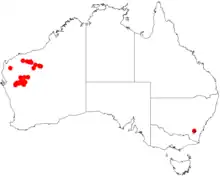Acacia distans
Acacia distans is a tree belonging to the genus Acacia and the subgenus Juliflorae that is endemic to arid parts of western Australia.
| Acacia distans | |
|---|---|
| Scientific classification | |
| Kingdom: | Plantae |
| Clade: | Tracheophytes |
| Clade: | Angiosperms |
| Clade: | Eudicots |
| Clade: | Rosids |
| Order: | Fabales |
| Family: | Fabaceae |
| Subfamily: | Caesalpinioideae |
| Clade: | Mimosoid clade |
| Genus: | Acacia |
| Species: | A. distans |
| Binomial name | |
| Acacia distans | |
 | |
| Occurrence data from AVH | |
Description
The tree typically grows to a height of 2 to 10 metres (7 to 33 ft) and has fissured and fibrous grey bark.[1] It has slender glabrous slender and sometimes pendulous branchlets with sericeous new shoots with hairs that become silver with age. Like most species of Acacia it has phyllodes rather than true leaves. The thinly coriaceous grey-green phyllodes have a linear to curved shape and are 6 to 15 cm (2.4 to 5.9 in) in length and a width of 4 to 12 mm (0.16 to 0.47 in) wide and are finely striated with a central nerve that is more prominent than the others.[3] It blooms between March and May and produces yellow flowers.[1] The rudimentary inflorescences form two-headed racemes along an 0.5 to 1 mm (0.020 to 0.039 in) axes with cylindrical flower-spikes that have a length of up to 11 cm (4.3 in) and a diameter of 4 to 5 mm (0.16 to 0.20 in) packed with golden flowers. The thinly crustose seed pods that form after flowering have a linear shape but are raised over and shallowly constricted between each of the seeds. the pods have a length of up to 14 cm (5.5 in) and a width of 3 to 5 mm (0.12 to 0.20 in). They contain glossy dark brown coloured seeds that have an elliptic to broadly elliptic shape and a length of about 6 mm (0.24 in).[3]
Distribution
It is native to an area in the Pilbara and Mid West regions of Western Australia where it is commonly found in river beds, hardpans and floodplains where it grows in loam, clay, alluvium and red sandy soils.[1] It has a discontinuous distribution and is often found around the headwaters and upper catchment areas of the Fortescue, Gascyone and Murchison Rivers where it is found on alluvial plains growing in loamy soils as a part of low woodland or shrubland communities and are known to form pure stands.[3]
See also
References
- "Acacia distans". FloraBase. Western Australian Government Department of Biodiversity, Conservation and Attractions.
- Maslin, B.R. (1983). "Studies in the genus Acacia (Leguminosae: Mimosoideae) - 14. New taxa from north-west Western Australia". Nuytsia. 4 (3): 386, figs 3, 4.
- "Acacia distans". WorldWideWattle. Western Australian Herbarium. Retrieved 10 April 2020.